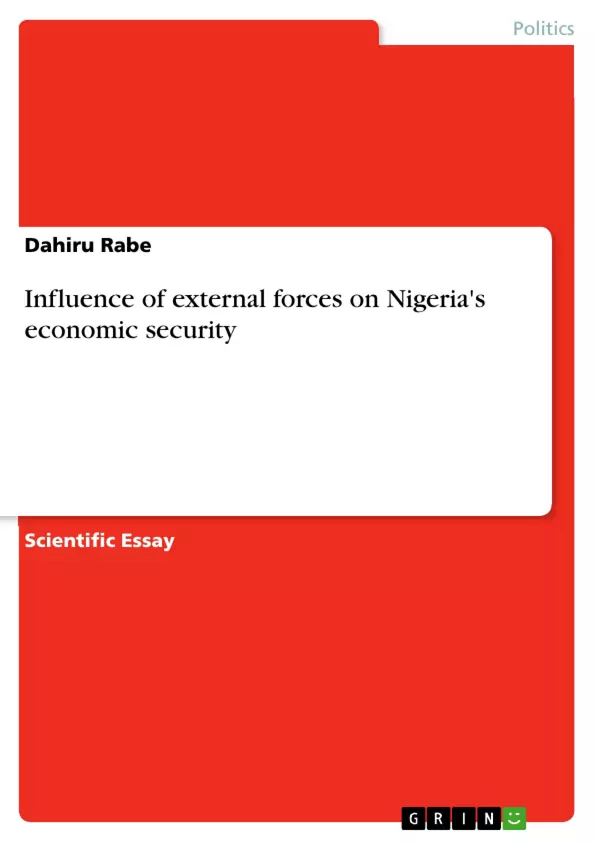ABSTRACT
After about five decades of political independence, all efforts towards prosperous Nigeria were devastated by corruption, fraud, poverty, insecurity and primitive wealth accumulation. A lot is being said on the actual causes of the Nigeria’s socio-political and economic predicaments especially in the wake of the present century. This paper explores and analyses the roles of the so-called ‘United Nation Development partners’ (the World Bank, the International Monetary Fund and the World Trade Organization) in making Nigeria one of the poorest and corrupt countries on earth. The paper also sheds more light on how the activities of these institutions pushed Nigeria into the “poverty-trap” which makes it difficult for the country to harness the vast human and material resources available for a common goal.
Inhaltsverzeichnis (Table of Contents)
- ABSTRACT
- INTRODUCTION
- EXTERNAL FORCES
- POVERTY
- THE ACTIVITIES OF EXTERNAL FORCES IN NIGERIA
Zielsetzung und Themenschwerpunkte (Objectives and Key Themes)
This paper investigates the impact of "United Nations Development Partners" (the World Bank, IMF, and WTO) on Nigeria's economic security. It aims to analyze how these institutions' activities have contributed to Nigeria's poverty and economic stagnation despite abundant natural resources.
- The influence of international institutions on Nigeria's economic development
- The impact of structural adjustment programs on Nigeria's economy
- The role of globalization and trade liberalization in shaping Nigeria's economic landscape
- The challenges of poverty and underdevelopment in Nigeria
- The relationship between external forces and Nigeria's political and social structures
Zusammenfassung der Kapitel (Chapter Summaries)
- ABSTRACT: This section provides a concise overview of the paper's focus, highlighting the detrimental impact of international institutions on Nigeria's economic security.
- INTRODUCTION: This chapter outlines Nigeria's abundant human and material resources, tracing the country's economic trajectory from an agriculture-based economy to an oil-dependent one. It emphasizes the disparity between Nigeria's wealth and the low standard of living of its citizens.
- EXTERNAL FORCES: This section defines the concept of "External Forces" as encompassing the IMF, World Bank, and WTO. It describes their roles within the United Nations and their impact on global economic development.
- POVERTY: This chapter discusses the various definitions of poverty, highlighting the World Bank's definition of extreme poverty and its implications for individual well-being.
- THE ACTIVITIES OF EXTERNAL FORCES IN NIGERIA: This section explores the role of the IMF, World Bank, and WTO in shaping the Nigerian economy. It delves into the World Bank's early involvement in Nigeria, starting with a critical study on the country's economic future in 1955.
Schlüsselwörter (Keywords)
This paper focuses on the themes of economic security, international development, structural adjustment programs, poverty, globalization, trade liberalization, and the role of external forces in shaping Nigeria's economic landscape.
Frequently Asked Questions
How do international organizations influence Nigeria's economy?
Institutions like the World Bank, IMF, and WTO shape Nigeria's economic policies through structural adjustment programs and trade liberalization, which the paper argues have often contributed to economic stagnation.
What is the "poverty trap" in the Nigerian context?
The poverty trap refers to a situation where external debt, corruption, and policies imposed by external forces make it difficult for Nigeria to use its vast natural resources for sustainable development.
Why has Nigeria's oil wealth not led to a high standard of living?
The paper highlights corruption, fraud, and a shift from an agriculture-based economy to an oil-dependent one, combined with external economic pressures, as key reasons for the disparity.
What role does the World Trade Organization (WTO) play in Nigeria?
The WTO promotes trade liberalization, which can expose local Nigerian industries to intense global competition, sometimes hindering the growth of domestic manufacturing.
How did the World Bank's involvement in Nigeria begin?
The World Bank's involvement dates back to at least 1955, when it conducted a critical study on the country's economic future, setting the stage for decades of policy influence.
- Citar trabajo
- Dahiru Rabe (Autor), 2008, Influence of external forces on Nigeria's economic security, Múnich, GRIN Verlag, https://www.grin.com/document/189399



